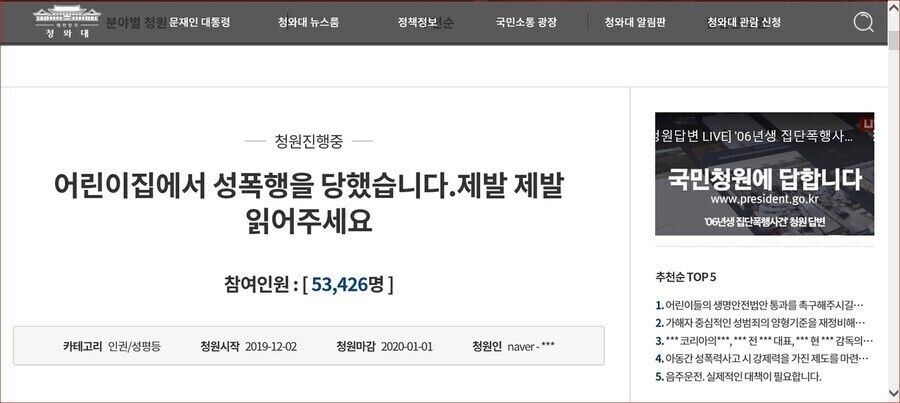hankyoreh
Links to other country sites 다른 나라 사이트 링크
Korean preschool instructors struggle with dealing sexual behavior by young children

Korean preschool teachers struggle to deal appropriately with sexual behavior by young children, a government survey finds.
In one survey, 77 of 96 preschool teachers (79.4%) and 44 of 102 preschool directors (43.1%) reported having had an uncomfortable experience involving sexual behavior by preschoolers. The survey was part of material about dealing with sexually deviant behavior by preschoolers that the Ministry of Health and Welfare (MOHW) provided Kang Sun-woo, a lawmaker with South Korea’s Democratic Party, on Sept. 27.
MOHW commissioned the study after the guardian of a young child who’d been sexually abused last year by other children at a preschool in Seongnam, Gyeonggi Province, posted a petition to the Blue House website asking for the government to set up an arbitration system to provide relief for such abuse.
The survey of these 199 preschool teachers and directors found that sexual behavior could be observed in children as young as two or three. Common types of sexual behavior included peeking into the bathroom out of curiosity (69.8%), masturbatory behavior such as rubbing one’s genitals against the edge of a desk (68.2%), and children showing each other their body parts as a game (41.9%). Compulsory sexual behavior such as touching a friend’s genitalia without permission (7.5%) and forcing other children to play sexual games (5.4%) were also reported, though they were relatively uncommon.
Despite their frequent observation of sexual behavior by preschoolers, teachers generally say that there’s a lack of sexual education protocols to which they can refer. In the survey, 48% of preschool directors said they hadn’t prepared any materials of this sort. When asked to rate the adequacy of guidance material for the issue of sexual behavior by young children, preschool staff only gave an average of 2.18 out of 5 stars.
Amid these systemic shortcomings, preschool sex education depends on the personal capabilities of individual teachers. According to 40.8% of preschool teachers, the most difficult aspect of dealing with sexual behaviors is “interaction and guidance methods.” That is, teachers are unsure how to explain why a given sexual behavior is wrong without implanting negative attitudes about sexuality.
Some preschool teachers admitted that they’ve never been told how to handle an incident such as what happened at the Seongnam preschool and frankly have no idea what to do. During in-depth interviews with researchers, preschool directors and preschoolers’ parents brought up some incidents that had been handled improperly. One teacher was reluctant to approach a child who masturbated, afraid that the child “would smell,” while another teacher remarked that a child offender had “always been smart” and that “it’s hard to raise boys these days,” right in front of the victim’s parents.
On Sept. 26, the government announced a number of measures prompted by the Seongnam preschool incident, such as designating a teacher to be in charge of sexual education at preschools and elementary schools. But the preschool directors and teachers who took part in the survey were concerned that the new measures would create too much work and said that external experts should be hired to provide sex education.
By Park Yoon-kyung, staff reporter
Please direct comments or questions to [english@hani.co.kr]

Editorial・opinion
![[Column] Park Geun-hye déjà vu in Yoon Suk-yeol [Column] Park Geun-hye déjà vu in Yoon Suk-yeol](https://flexible.img.hani.co.kr/flexible/normal/500/300/imgdb/original/2024/0424/651713945113788.jpg) [Column] Park Geun-hye déjà vu in Yoon Suk-yeol
[Column] Park Geun-hye déjà vu in Yoon Suk-yeol![[Editorial] New weight of N. Korea’s nuclear threats makes dialogue all the more urgent [Editorial] New weight of N. Korea’s nuclear threats makes dialogue all the more urgent](https://flexible.img.hani.co.kr/flexible/normal/500/300/imgdb/original/2024/0424/7317139454662664.jpg) [Editorial] New weight of N. Korea’s nuclear threats makes dialogue all the more urgent
[Editorial] New weight of N. Korea’s nuclear threats makes dialogue all the more urgent- [Guest essay] The real reason Korea’s new right wants to dub Rhee a founding father
- [Column] ‘Choson’: Is it time we start referring to N. Korea in its own terms?
- [Editorial] Japan’s rewriting of history with Korea has gone too far
- [Column] The president’s questionable capacity for dialogue
- [Column] Are chaebol firms just pizza pies for families to divvy up as they please?
- [Column] Has Korea, too, crossed the Rubicon on China?
- [Correspondent’s column] In Japan’s alliance with US, echoes of its past alliances with UK
- [Editorial] Does Yoon think the Korean public is wrong?
Most viewed articles
- 1‘We must say no’: Seoul defense chief on Korean, USFK involvement in hypothetical Taiwan crisis
- 2Will NewJeans end up collateral damage in internal feud at K-pop juggernaut Hybe?
- 3[Column] Park Geun-hye déjà vu in Yoon Suk-yeol
- 4Why Korea shouldn’t welcome Japan’s newly beefed up defense cooperation with US
- 5Thursday to mark start of resignations by senior doctors amid standoff with government
- 6N. Korean hackers breached 10 defense contractors in South for months, police say
- 7[Guest essay] The real reason Korea’s new right wants to dub Rhee a founding father
- 8[Column] ‘Choson’: Is it time we start referring to N. Korea in its own terms?
- 9Kim Jong-un expressed ‘satisfaction’ with nuclear counterstrike drill directed at South
- 10[Editorial] New weight of N. Korea’s nuclear threats makes dialogue all the more urgent